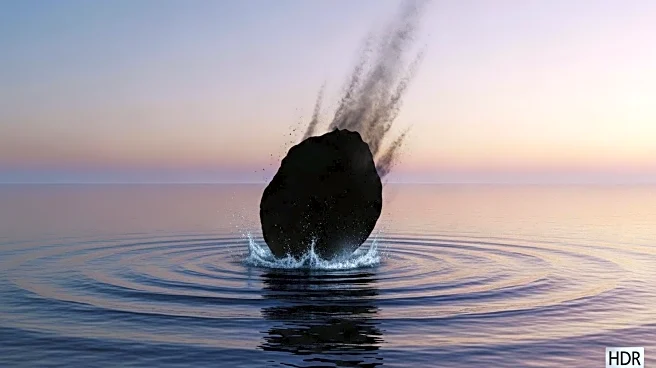What's Happening?
The Silverpit Crater, located beneath the North Sea, has been confirmed as the result of an asteroid impact by a team led by Dr. Uisdean Nicholson of Heriot-Watt University. This discovery, published in Nature Communications, ends years of debate regarding the crater's origin. The crater, discovered in 2002, spans 1.8 miles and is surrounded by a ring of circular faults. New seismic imaging and analysis of rock samples have provided definitive evidence of shocked crystals, indicative of high-velocity impacts. The asteroid, estimated to be 530 feet wide, struck the seabed at a low angle, creating a massive tsunami over 330 feet high.
Why It's Important?
The confirmation of Silverpit as an impact crater has significant implications for understanding Earth's geological history and the potential for future asteroid impacts. The study provides insights into the dynamics of such impacts, highlighting the catastrophic effects they can have, such as generating massive tsunamis. This research underscores the importance of studying impact craters to better understand both historical and future asteroid collisions. The findings offer a unique opportunity to explore planetary impact processes, which can inform planetary defense strategies and preparedness for potential future asteroid threats.
What's Next?
The confirmation of Silverpit as an impact site opens avenues for further geological research. Researchers aim to use the new data to explore subsurface effects of impacts on Earth, which can offer insights into similar processes on other planets. The study of impact craters like Silverpit can enhance understanding of Earth's dynamic geological history and inform strategies for planetary defense against future asteroid impacts. Continued research may reveal more about the processes that have shaped Earth's surface over millions of years.
Beyond the Headlines
The discovery of Silverpit as an impact crater highlights the dynamic nature of Earth's geological history and the potential hazards posed by asteroid impacts. Understanding these events can influence approaches to planetary defense and preparedness for future asteroid threats. The study of impact craters provides valuable insights into the processes that have shaped Earth and other planets, offering a deeper understanding of planetary evolution and potential future challenges.









